
International Journal of Simulation Modelling
Scope & Guideline
Transforming Data into Dynamic Models for Real-World Solutions
Introduction
Aims and Scopes
- Simulation Methodologies:
The journal extensively covers various simulation methodologies including discrete event simulation, agent-based modeling, and system dynamics, highlighting their application in real-world scenarios. - Optimization Techniques:
A significant focus is placed on optimization techniques used alongside simulation models to enhance decision-making processes in manufacturing, logistics, and resource management. - Industry Applications:
The journal features applications of simulation in various industries such as manufacturing, transportation, healthcare, and urban planning, demonstrating the versatility and practical implications of simulation models. - Digital Twins and IoT Integration:
Recent publications have increasingly addressed the integration of digital twin technology and the Internet of Things (IoT) into simulation models, reflecting the journal's commitment to contemporary technological advancements. - Sustainability and Environmental Impact:
The journal also emphasizes the importance of sustainable practices through simulation, providing insights into environmental impacts and optimization strategies for green logistics and manufacturing.
Trending and Emerging
- Digital Twin Technologies:
An increasing number of papers are exploring the application of digital twins in various industries, showcasing their potential for real-time monitoring and optimization of processes. - Artificial Intelligence and Machine Learning Integration:
There is a growing trend towards integrating artificial intelligence and machine learning techniques with simulation models, enhancing predictive capabilities and decision-making processes. - Sustainable and Green Practices:
Research focused on sustainability and environmental impacts is on the rise, with authors examining the role of simulation in promoting green logistics, waste management, and resource optimization. - Smart Manufacturing and Industry 4.0:
The journal is increasingly featuring studies on smart manufacturing practices and Industry 4.0 technologies, reflecting a shift towards automation and smart systems in production. - Complex Systems and Network Analysis:
Emerging themes in complex systems and network analysis indicate a trend towards understanding intricate interactions within and between systems, utilizing simulation to explore these dynamics.
Declining or Waning
- Traditional Manufacturing Processes:
Research focused on conventional manufacturing processes without the integration of advanced technologies like automation or IoT has decreased, indicating a shift towards more innovative and tech-driven approaches. - Basic Simulation Techniques:
There has been a decline in publications centered around basic simulation techniques, suggesting that authors are now favoring more complex and hybrid models that incorporate machine learning and optimization. - Standalone Simulation Models:
The prevalence of standalone simulation models that do not incorporate real-time data or feedback mechanisms has waned, reflecting a trend towards more dynamic and interactive simulation frameworks. - Non-Industrial Applications:
There is a noticeable decrease in non-industrial applications of simulation, such as those in social sciences or arts, as the journal increasingly focuses on industrial and technological applications.
Similar Journals
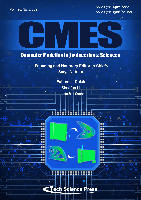
CMES-COMPUTER MODELING IN ENGINEERING & SCIENCES
Empowering Innovation through Modeling & SimulationCMES-COMPUTER MODELING IN ENGINEERING & SCIENCES is a premier journal published by Tech Science Press, dedicated to advancing knowledge in the fields of computer science applications, modeling and simulation, and software engineering. With an impressive convergence of research from 2000 to 2024, this journal stands out as a vital resource for researchers, professionals, and students alike, fostering innovation and collaboration in computational methodologies. The journal currently holds a Q3 category ranking in multiple disciplines according to the latest metrics, including Scopus, which reflects its growing significance in the academic community. By providing a platform for high-quality research and open discourse, CMES aims to enhance the understanding of complex systems through effective modeling techniques and computational tools. Despite its current classification under open access, the journal remains a cornerstone for those looking to deepen their expertise in cutting-edge computational engineering and science.

NAVAL RESEARCH LOGISTICS
Charting Innovations in Maritime Management ScienceNAVAL RESEARCH LOGISTICS is a prestigious scholarly journal, published by WILEY, that serves as a vital platform for researchers and professionals in the fields of management science, operations research, ocean engineering, mathematics, and modeling and simulation. With an impressive impact factor and recognized as a Q1 journal in its respective categories, it reflects the highest standards of quality and rigor in research dissemination. Covering discussions from its inception in 1973 to the present, NAVAL RESEARCH LOGISTICS addresses key issues and innovations in logistics and operational challenges, particularly within the naval context, thus making significant contributions to policy and strategic decision-making. The journal is not currently available as an open-access publication, yet it provides rich insights essential for academics, industry experts, and students keen on advancing their knowledge in logistics and operations related to maritime applications. With a commitment to bridging theory and practice, this journal is an indispensable resource for anyone connected to the maritime logistics field.
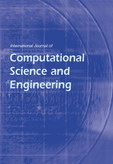
International Journal of Computational Science and Engineering
Driving Excellence in Computational Techniques and MethodologiesThe International Journal of Computational Science and Engineering, published by InderScience Enterprises Ltd, is a premier platform dedicated to the interdisciplinary field of computational science and engineering. With an ISSN of 1742-7185 and an E-ISSN of 1742-7193, the journal has been serving the academic community since its establishment in 2005 and will continue to do so until 2024. Notably categorized in the Q3 quartile for various domains, including Computational Mathematics, Software, and Hardware and Architecture, it holds respectable rankings in Scopus, evidencing its importance in advancing research and practice. While the journal is not open-access, it offers subscription options that ensure wide dissemination among researchers, professionals, and students. The journal aims to publish high-quality original research articles, survey papers, and case studies that contribute to the theoretical and practical aspects of computational techniques and methodologies. In a rapidly evolving digital landscape, this journal is a valuable resource for those seeking to push the boundaries of knowledge in computational science.
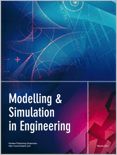
Modelling and Simulation in Engineering
Advancing Engineering Through Innovative SimulationsModelling and Simulation in Engineering is a pioneering open-access journal, published by HINDAWI LTD, and established in 2007. With a focus on advancing the fields of engineering, computer science applications, and modeling and simulation, this esteemed journal serves as a vital platform for researchers, professionals, and students alike. The journal has made significant strides in its academic contributions, reflected in its current categorization within the Q3 quartile in Computer Science Applications, Engineering (miscellaneous), and Modeling and Simulation as of 2023. With a Scopus ranking of 133 out of 307 in General Engineering and 183 out of 324 in Mathematics' Modeling and Simulation, it emphasizes the crucial interplay between theoretical research and practical applications. Each article published in Modelling and Simulation in Engineering undergoes a rigorous peer-review process, ensuring high-quality research dissemination. By maintaining an open-access format, the journal promotes global collaboration and accessibility, supporting the dissemination and advancement of engineering knowledge worldwide. With its headquarters located in the United States, the journal is truly positioned at the convergence of innovation and research.
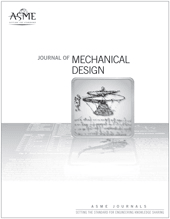
JOURNAL OF MECHANICAL DESIGN
Elevating Standards in Mechanical Engineering Research.JOURNAL OF MECHANICAL DESIGN, published by the renowned American Society of Mechanical Engineers (ASME), is a leading peer-reviewed journal dedicated to the dissemination of cutting-edge research in the fields of mechanical engineering, computer graphics, and computer-aided design. With an impressive impact factor and categorized within the top Q1 quartile across multiple disciplines, it ranks among the most influential journals in engineering, aiming to foster innovation and collaboration among researchers and practitioners. The journal has maintained its stature since its inception in 1978, presenting articles that encompass a broad range of topics, including advanced design methodologies and novel applications of mechanical systems. The journal does not operate under an open-access model, ensuring that its content remains exclusive for its affiliated audience. As it plans to continue publishing until 2024, the JOURNAL OF MECHANICAL DESIGN stands as a crucial resource for professionals and academics seeking to enhance their knowledge and contribute to advancements in mechanical design.
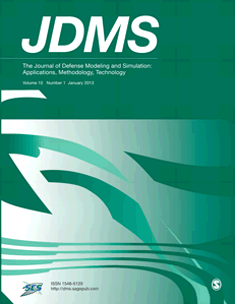
Journal of Defense Modeling and Simulation-Applications Methodology Technology-JDMS
Exploring New Frontiers in Defense Technology and ApplicationsThe Journal of Defense Modeling and Simulation: Applications Methodology Technology (JDMS), published by SAGE Publications Inc, is an esteemed platform dedicated to advancing the field of defense modeling and simulation. Established in 2004, this journal has become a vital resource for researchers, practitioners, and students engaged in engineering and modeling disciplines, as evidenced by its Q2 rank in Engineering (miscellaneous) and Q3 in Modeling and Simulation categories in the 2023 metrics. With an ISSN of 1548-5129 and an E-ISSN of 1557-380X, JDMS features cutting-edge methodologies and applications that enrich the technological landscape essential for modern defense operations. Although it is not an Open Access journal, it continues to foster knowledge sharing through rigorous peer-reviewed articles. By bridging theoretical advancements with practical applications, JDMS plays a critical role in promoting innovation and collaboration in the defense sector, making it a must-read for those committed to pushing the boundaries of this dynamic field.
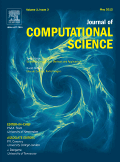
Journal of Computational Science
Transforming Ideas into Computational SolutionsThe Journal of Computational Science, published by Elsevier, is a premier academic journal that serves as a vital platform for researchers and professionals in the fields of computer science, modeling, and simulation. With an ISSN of 1877-7503 and an E-ISSN of 1877-7511, this journal focuses on the latest advances in computational methodologies and their applications, fostering interdisciplinary dialogue and collaboration. As of 2023, it holds an impressive Q2 ranking in multiple categories, including Computer Science (miscellaneous), Modeling and Simulation, and Theoretical Computer Science, showcasing its relevance and impact within the scholarly community. The journal features comprehensive research articles, reviews, and case studies that contribute significantly to the understanding and development of computational techniques. With its high standing in Scopus rankings, including a 79th percentile ranking in Mathematics - Modeling and Simulation, the Journal of Computational Science is an essential resource for anyone seeking to advance their knowledge and research in this dynamic field.
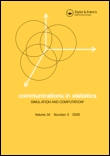
COMMUNICATIONS IN STATISTICS-SIMULATION AND COMPUTATION
Transforming Data into Knowledge through Statistical ExcellenceCOMMUNICATIONS IN STATISTICS-SIMULATION AND COMPUTATION, published by TAYLOR & FRANCIS INC, is a pivotal journal in the fields of statistics, modeling, and simulation, catering to an audience of researchers, professionals, and students. With an ISSN of 0361-0918 and an E-ISSN of 1532-4141, this esteemed journal has been disseminating knowledge since 1976, covering a wide range of innovative methodologies and applications in statistics. Ranked in the third quartile for both Modeling and Simulation, and Statistics and Probability, as per the 2023 Category Quartiles, this journal serves as a crucial platform for advancing academic discourse and practical applications in these areas. Though not open access, it houses a wealth of peer-reviewed articles that contribute to the advancement of statistical theory and computational techniques, while its Scopus ranking positions it among the significant publications in the relevant fields. For those looking to stay at the forefront of statistical science, this journal is an invaluable resource.

SIMULATION MODELLING PRACTICE AND THEORY
Unlocking the Potential of Simulation for Real-World Solutions.SIMULATION MODELLING PRACTICE AND THEORY is a leading academic journal published by Elsevier that focuses on the dynamic and evolving fields of simulation modeling and its applications across various disciplines. Established in 2002, this journal has rapidly gained recognition within the academic community, achieving a prestigious Q1 ranking in both Hardware and Architecture, as well as Modeling and Simulation for 2023. With an impressive impact factor that reflects its significance, it offers essential insights and findings pertinent to researchers, professionals, and students alike. The journal's scope encompasses a wide array of topics, encouraging interdisciplinary collaboration and innovation. Open access options further enhance visibility and accessibility of published research, contributing to the dissemination of knowledge in this critical field. Operating from its base in Amsterdam, Netherlands, SIMULATION MODELLING PRACTICE AND THEORY continues to provide a vital platform for advancements in simulation methodologies and applications, fostering an environment where theoretical principles and practical implementation converge.

INTERNATIONAL JOURNAL OF INDUSTRIAL ENGINEERING-THEORY APPLICATIONS AND PRACTICE
Bridging theoretical advancements with real-world applications.INTERNATIONAL JOURNAL OF INDUSTRIAL ENGINEERING - THEORY APPLICATIONS AND PRACTICE is a pivotal academic resource dedicated to advancing the field of Industrial Engineering. Published by the esteemed University of Cincinnati, this journal, bearing the ISSN 1072-4761 and E-ISSN 1943-670X, has been an influential platform since its inception in 1994, highlighting innovative research, theoretical advancements, and practical applications in industrial engineering. Positioned within the Q3 category in Industrial and Manufacturing Engineering, this journal aims to disseminate knowledge and foster collaboration among researchers, professionals, and students across the globe. Despite not being open access, the journal promotes impactful scholarship with its work being rigorously peer-reviewed, ensuring high-quality publications that contribute significantly to the field. By exploring diverse topics that intersect theory and practical solutions, the journal effectively caters to the growing demand for knowledge in this specialized area, making it a vital resource for anyone looking to stay ahead in industrial engineering and related disciplines.